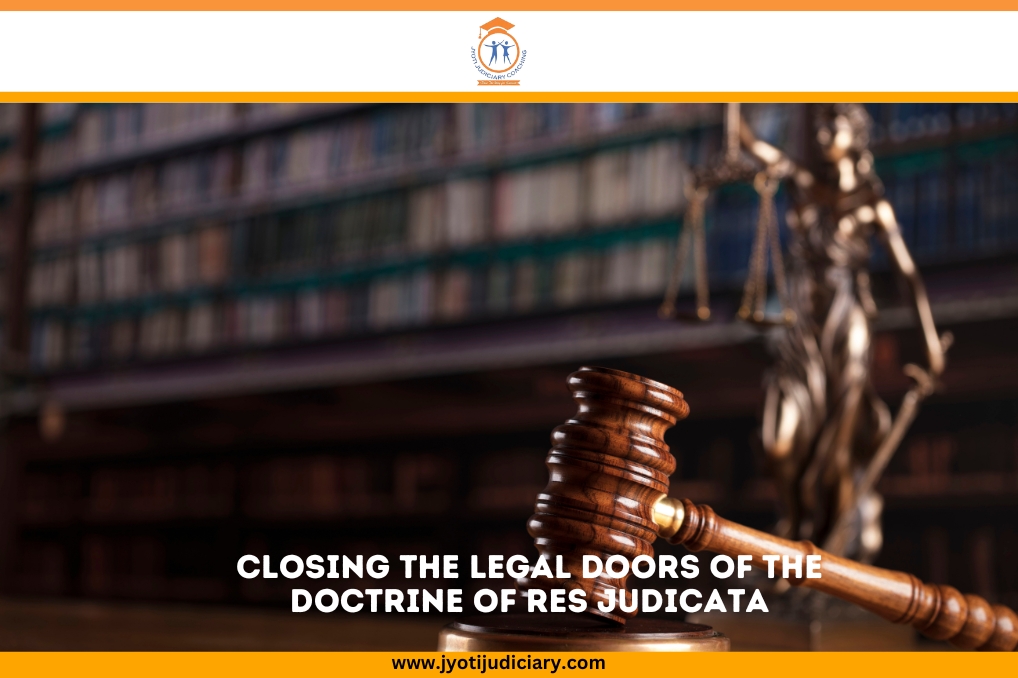
The Civil Procedure Code of 1908’s Section 11 embodies the res judicata concept, often known as the norm of conclusiveness of judgment, in relation to previously determined cases matters of fact, law, or law and fact, in addition to in each subsequent lawsuit involving the same parties.
As per the legal provisions, a topic cannot be brought up again in a separate lawsuit once it has been properly resolved by an appropriate court. In the absence of such a regulation, disagreements would never come to a conclusion, leaving the parties open to ongoing conflict, intimidation, and expenses.
The Doctrine of Res Judicata
- When combined, res and judicata legal terms signify “a matter adjudicated.”
- As per the res judicata meaning, the parties to the current case have already settled the dispute in a different court, and the court is currently deliberating over the matter.
- The court will dismiss this case because it has previously been decided by another court.
- Both criminal and civil law are governed by the res judicata doctrine. It is not permitted to retry any litigation that has already been tried, either directly or indirectly.
- res judicata example: It is likely not possible for a plaintiff to sue the defendant in case B based on the same facts and actions if he wins or loses in case A.
Doctrine of Res Judicata: Its Purpose
- The res judicata in cpc doctrine aims to promote just and equitable justice administration by discouraging the abuse of the legal system.
- The legal notion of res judicata applies when a party that was awarded a judgment in a previous case involving the same parties wants to file a new lawsuit on the same subject.
Res Judicata in Constitutional Law
- The objective of the res judicata concept is to stop the misuse of the law and to encourage the honest and equitable administration of justice.
- After receiving a decision in a previous case involving the same parties, if a party wishes to file a new lawsuit on the same subject, the legal theory of res judicata comes into play.
Res Judicata Family Law
- With the exception of future petitions on the same subject, maintenance petitions filed under Section 125 CrPC. are governed by the res judicata doctrine.
- Section 127 CrPC. is the proper avenue to pursue a modification of maintenance due to altered circumstances.
Res Judicata in International Law
- Res judicata, sometimes known as the “triple-identity criteria,” holds that a prior and final judgment is binding in later proceedings containing the same (i) parties, (ii) subject matter, and (iii) legal grounds.
- A general legal principle that is recognized by both domestic and international law is known as res judicata. International arbitral awards are regarded as final and binding, much like local court rulings.
- Arbitral tribunals typically have to determine whether a previous court ruling is res judicata. Nonetheless, res judicata disputes may also arise in relation to arbitral awards made by other arbitral tribunals.
Case Law on Res Judicata
The recent case laws on res judicata are as follows:
- In the seminal case of Devilal Modi v STO, B contested the legitimacy of Article 226 order of assessment. On the grounds of merit, the petition was denied. The Supreme Court likewise dismissed the appeal against the order for good reason. B appealed the same assessment order once more in a writ suit at the same High Court. The High Court denied the petition on this occasion. The Supreme Court ruled that the res judicata principle precluded the petition.
- It was decided in Mathura Prasad v Dossibai that res judicata is a legal agreement between the parties to a prior case and cannot be changed in a subsequent one. Even in matters of law, a competent court’s ruling is usually res judicata. However, a lawsuit unconnected to the circumstances giving rise to the right will not be used as res judicata. An authority has already changed the judgment when there is a change in the cause of action or the legislation. In the ensuing proceeding, the ruling will be deemed genuine and res judicata will not apply.
The Doctrine of Res Judicata may be thought of as a restriction on any party’s capacity to “move the time machine back” while the case is still ongoing. Among the various cases that come under the broad concept of res judicata is litigation representing the interests of the public.
Doctrine of Res Judicata FAQs
1. What are the limitations of res judicata?
A new plea may not be banned if it results from something that happened after the preceding proceeding. Similarly, the doctrine might not apply if the previous ruling contained a fundamental error or if the matter was not immediately and materially in dispute.
2. When res judicata does not apply?
Res Judicata is not applicable if the matter is not ultimately heard and determined: Should the “Previous lawsuit be settled out-of-court” Should the “Previous lawsuit be dismissed due to insufficient evidence presented,” In the event that the “pre-mature suit was dismissed,”
3. What are the exemptions of res judicata?
The doctrine of res judicata would not apply in cases where the decree was obtained via deliberate fraud or deception of the court, or in situations where the proceedings were conducted entirely in accordance with an unusual statute. In light of this, none of the rulings in the earlier ruling would be res judicata.
4. Does res judicata restrict appeals?
A res judicata case prevents the issue from coming up again, either in the same court or in a different one.
5. What is the scope of res judicata?
High public policy considerations serve as the foundation for the broad theory. It seeks to accomplish two goals: first, litigation must have a certain outcome; second, people shouldn’t be bothered by the same type of litigation twice.
6. Can res judicata be given without jurisdiction?
A court’s ruling will only be deemed res judicata if it is rendered based solely on the merits of the case. Therefore, a suit or dismissal for lack of jurisdiction will not serve as res judicata if the court issues a compromise decision or for other reasons.
7. What are the rules of res judicata?
A court cannot hear a lawsuit or issue if the subject matter has already been heard and decided in a “former suit,” either directly or indirectly.
8. What is the origin of the res judicata?
The English Common Law system is where the idea of Res Judicata originated. It is based on the fundamental ideas of judicial economy, consistency, and finality. The common law was incorporated into the Code of Civil Procedure, which was thereafter incorporated into the Indian legal system as a whole.
9. Why is res judicata important?
A second action on previously litigated subjects as a whole and causes of actions/claims arising from comparable subject matter are barred by res judicata.
10. What is res judicata in CPC?
Section 11 of the Civil Procedure Code, 1908 governs the doctrine of res judicata, which prohibits a court from re-examining a case that it has already firmly decided, involving the same parties, subject matter, and title.
11. What maxim is res judicata based on?
The maxim “interest reipublicae ut sit finis litium” states that ending a lawsuit is in the best interests of the State; and. Judiciary regarded as true is known as res judicata pro veritate occipitur.
With the goal of giving students the best coaching available for law entrance exams including the CLAT, AILET, and various other state judiciary exams, Jyoti Judiciary Coaching, India’s Finest educational Platform, was established. Come enroll now with Jyoti Judiciary!
For any latest news, legal topics, judiciary exams notifications, patterns, etc watch Jyoti Judiciary’s YouTube channel for legal videos for any updates at https://youtube.com/@jyotijudiciarycoaching4852?si=2cwubh9d2A9urwJf










